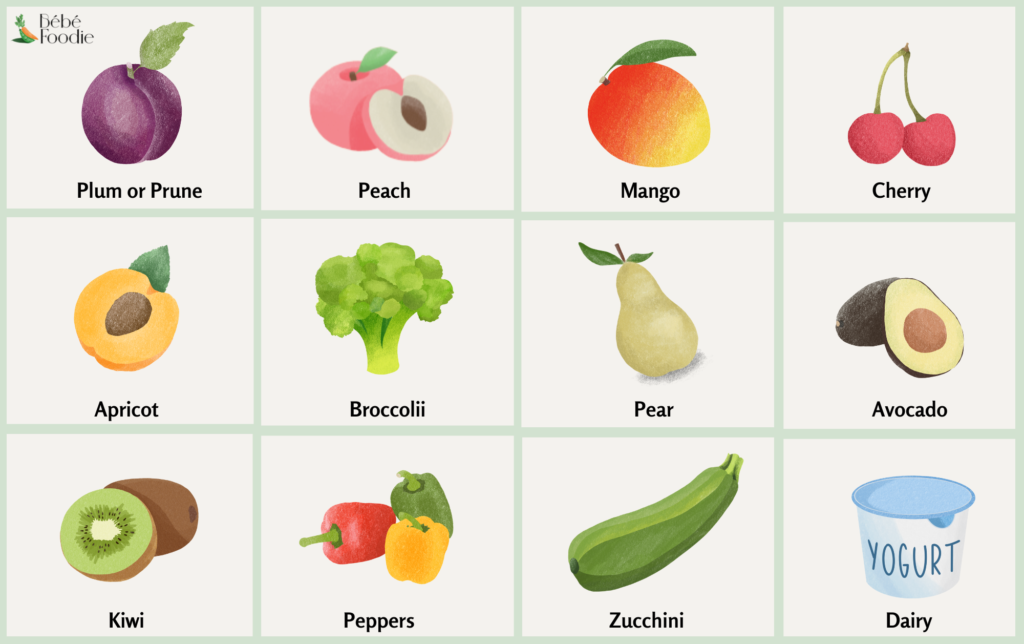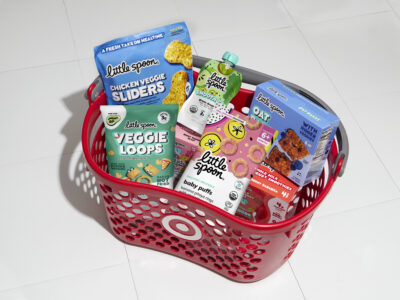Need baby nutrition tips? Not sure how to start solids? Ask Lucie all of your questions this Friday, 10/14 LIVE in our Digital Community.
Before your baby starts on solids, the frequency of bowel movements can drastically vary from one baby to the next. Some might be having blowouts 5x a day and others only once every 3 days. These differences aren’t a concern as long as you have plenty of wet diapers on hand.
When your baby enters the solids world, it can be both exciting and confusing. Not only are you introducing new flavors and foods to your little, but you might see some changes in their bowel movements – which is totally normal. As you introduce new foods and ingredients, one very common challenge is constipation— a normal reaction as your little one adapts to these big changes. One way to prevent constipation is to introduce foods slowly to help regulate, as your baby won’t have 3 square meals a day right away. But sometimes it is inevitable.
So, how can you identify constipation and what are ways to prevent or combat the #2 stoppage? We’re breaking it down for you below.
Common signs of constipation:
- Consistently dry, hard, small stool that can be difficult to pass
- Few to no bowel movements (less than 3 a week)
- Gas
- Hard and distended belly
- Loss of appetite
What are possible causes?
- Immature digestive system
- Your baby might be holding in their stool because of the unknown feeling. This will cause the stool to dry and remain in the large colon. Bowel movement is therefore more and more painful to pass and will lead to constipation.
- Some solid foods (white bread, pasta, rice cereals, dairy products…)
- Food sensitivity or intolerance
- Family history
- Baby recovering from an illness
- Certain medications
- Outside stress or changes in the schedule
What are some poop-friendly foods to include in your baby’s diet?
High-fibers foods often help soften stool, alleviate any pain, or prevent constipation altogether. Here are the most common examples:

You can find most of these ingredients in Little Spoon’s Babyblends or Smoothies!
What foods should you avoid and/or reduce if your baby is prone to constipation?

- White pasta – this can be replaced with whole grain or legume-based pastas as they are rich in fiber, iron and proteins. These are all good for the digestive system!
- Rice – this can be replaced with other types of grains such as quinoa, bulgur or barley.
- Bread with white flour – as long as the bread is whole wheat, whole grain or sourdough, you’re in good shape.
- Cooked Apples and unripe bananas can worsen symptoms. Try to offer raw apples instead (keeping in mind safety depending on your baby’s age) or offer bananas once they are fully ripened. If your child is particularly constipated, better to swap for another fruit (from the poop-friendly list for example!) until bowels return to normal.
Additional tips when offering solid foods to ease constipation:
- Small sips of liquid such as water can be proposed to baby throughout the day or along their meals. Remember that younger babies should not be offered too much water as to not interfere with their breastmilk or formula consumption. Check with your pediatrician to come up with an appropriate plan for your little one.
- Did you know that chia seeds can absorb 9 to12 times their own weight in water? Adding a tablespoon of chia seeds to your baby’s blend, oatmeal, or as a chia pudding can help draw water into your baby’s bowel.
- Healthy fats are a great food to ease constipation and should be incorporated. Options include coconut, olive oil, avocado oil, flaxseed oil, avocado and many more. Think of these ingredients as the lube for healthy digestion.
Natural remedies to ease constipation:
- Supplement with prebiotics and probiotics! This field of research is still relatively new, but probiotics are renowned to promote both digestive and immune health and prebiotics can serve as fuel for the beneficial bacteria in a baby’s gut. You can also help your baby increase the number of beneficial microbes with whole foods such as fermented food and high-fiber foods.
- Baby massage and exercise – Encourage your baby to crawl or do some bicycle leg movements to relieve gas and calm upset tummies.
- Baby belly massage is a great way to relax and loosen poop as it can be stimulating. Massage your baby’s belly in circular motion for a few minutes.
- As a last resort, rectal stimulation can be highly effective if done properly in the guidance of a healthcare professional. You also want to avoid using this method frequently as your baby can become dependent on it in order to poop. Check in with your pediatrician before taking these steps.
Never hesitate to seek support from your baby’s doctor if you have any concern or notice that symptoms are not improving or getting worse over time. Know that constipation, like so many changes that come as your little one ages and takes on new experiences, is very often normal and simply a “new normal” to approach in this crazy journey of parenthood.
Take an additional 20% off first consultation by mentioning #littlespoon22 while booking on Bébé Foodie.



